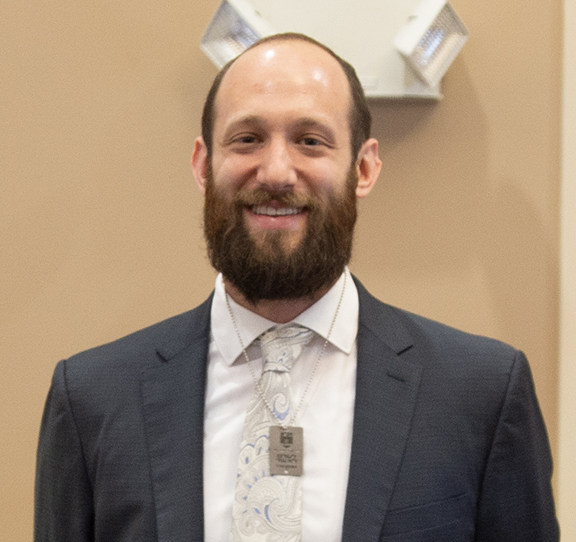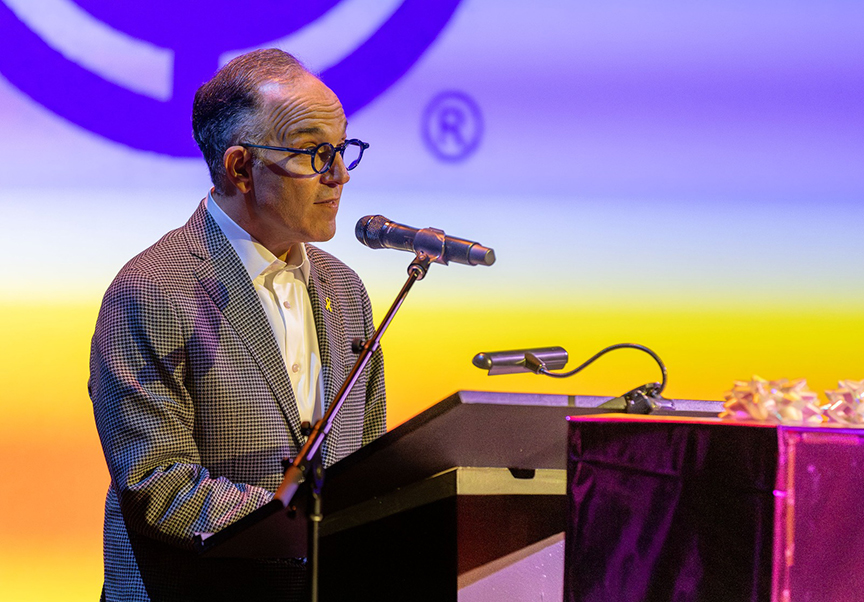Tsvey Brider: Where Black and Yiddish Musical Influences Intersect

Anthony Russell and Dmitri Gaskin
Anthony Mordechai Tzvi Russell and Dmitri Gaskin perform as Tsvey Brider, “Two Brothers,” but they had very different paths to Jewish music.
Russell, who became an opera singer after growing up in California, is now a pioneer in Yiddish music. Gaskin is an accomplished accordion player specializing in Klezmer music, and they met in San Francisco in 2013, part of the small group of Jewish music performers in the area.
They will perform at Birmingham’s Temple Beth-El on April 22, in a concert open to the community. The concert will be at 8 p.m., with a reception at 7:30 p.m. Tickets are $54, $90 per couple, and $25 for those under age 35. Registration is requested by April 18.
There will also be a free workshop on April 23 at 1 p.m., “A Stranger in a Strange Land: The Possibilities of African-American Music in Jewish Prayer Spaces.” Registration is required.
Russell will participate in the Shabbat services on April 21 at 5:45 p.m., and April 22 at 9:30 a.m., with a luncheon following.
Recently, Russell was added to the cultural offerings roster at the Jackson-based Goldring/Woldenberg Institute of Southern Jewish Life, which facilitates Jewish cultural events for communities in a 13-state region.
Russell was born in Fort Worth, Tex., then moved to California. His mother was a classical pianist, and “there was an appreciation in my house already for music,” he said. Around age 12 he started becoming a fan of opera, but not in the sense of becoming a singer.
After he tried “unsuccessfully” to become a pianist, “I decided to try my hand at singing,” and after less than a year of voice lessons, he won his first competition.
At age 17 he started looking for vocal work, and wound up in some opera choruses, then got a couple of larger roles.
He had a role in the world debut of the opera “Appomattox” in San Francisco in 2007. A couple aspects of the production were special, but one in particular turned out to be intensely meaningful.
“It was exciting” being part of an opera nobody had heard before, he said, as well as performing with so many other Black opera singers, “something you usually don’t see.”
But it was one scene that originally struck him as “bizarre” that would become most memorable. During the scene after the liberation of Richmond, President Abraham Lincoln comes to visit, and four newly-liberated slaves started singing verses from Psalm 47 to Lincoln.
Russell asked the librettist why he put something like that into the show, and the librettist told him that it had really happened that way.
The production was close to the High Holy Days, and Russell was in the process of exploring conversion to Judaism. The congregation where he attended Yom Kippur services did special readings each year during the Shofarot service. Much to his amazement, “out of all the words one could be singing and hearing during a very long service,” the reading that year was “the exact same words that I sang from the stage” in the opera.
Not only that, the reading was done in English. “It could have been in Hebrew and I wouldn’t have known.”
He later reflected that it was “an indication of my future, that’s eventually what I’d be doing all the time.”
He completed his conversion in 2011 and went to Tel Aviv University to study Yiddish.
Changing Styles
After about 15 years in opera, he began to grow tired of it, and briefly gave up singing.
Then, he was asked to lead “Unetaneh Tokef,” “one of the most important moments in the liturgical year” at a service at the New York congregation where his husband was a rabbi.
“The response from the congregation was very intense and came from a very personal place,” he said. “Somehow who I was and what I could do vocally came sharply into focus in the context of Jewish music at that moment.”
He began to consider exploring Jewish music, and started to look for a repertoire. He heard legendary cantor Sidor Bilarsky in the Coen Brothers’ film, “A Serious Man,” and identified with how he had started as an opera singer who then performed Yiddish art and Jewish cantorial music, and how he experimented with a fusion of styles.
In studying Bilarsky, “I found an entire repertoire of music that suited me as a performer and who I wanted to be as a performer,” he said.
His repertoire is “an archive of the history of Eastern European Jewry over the past 150 to 200 years,” and has a very wide range, from classic niggunim to labor and protest songs, Yiddish poetry to folk material adapted from the shtetls in central and Eastern Europe.
Unlike opera, performing this material is a far more personal experience with the audience.
“When I perform, in a sense I am performing aspects of the personal histories of many members of the audience,” he said. “For me it is much more rewarding, and much more rewarding for my audiences than the impersonal nature of classical music.”
He once was performing a Yiddish lullaby, and a woman in the audience was singing along. Afterward, she told him “my grandmother used to sing me that lullaby and I haven’t heard it since.”
“That’s an immense amount of connection to have with a complete stranger,” Russell said.
Another difference from opera is that the field of Yiddish music is much smaller and less competitive than opera, though he said “over past 10 years, new Yiddish performers are coming to the fore, and it is very exciting,” as all of them “are working to create, preserve and disseminate this beautiful 1000-year-old culture of music and words and the Yiddish language.”
He has been adding styles in recent years, especially combining “Ashkenazic Jewish folk music and African-American folk music at the places where those respective narratives overlap.”
For example, an early Israeli song about Moses is combined with “Wade in the Water.”
In 2018, he released an EP based on that fusion, “Convergence,” with Klezmer group Veretski Pass. A review from In Geveb, a journal of Yiddish studies, asked “what would it have sounded like if Sholem Aleichem’s late 19th-century Jewish, Yiddish-speaking characters had arrived at a Reconstruction-era Mississippi labor camp?”
“Rosie” is a pairing of the niggun “Es iz shoyn shpet” and “Rosie,” which Russell first heard on a recording of inmates at Mississippi’s Parchman Farm penitentiary.
But not all pieces are heavy — there’s “Rockin’ Jerusalem” paired with “Av Harachamim” on a Cuban melody.
Russell said he wants to have a space where “these respective histories could sing into each other.”
Brothers
Russell said he and Gaskin met about 10 years ago, as both of them were working in the field of Eastern European Jewish music. “He’d been an accordion player for a number of years, I’d been working as a Yiddish singer.” They collaborated, and decided to try writing original music in Yiddish. They set works to the poetry of modernist Yiddish poets, and their “Kosmopolitn” album, released last year, is “our original music set to the poetry of a group of amazing Yiddish poets from the first half of the 20th century.”
After collaborating for a couple of years, in 2017 they entered an International contest in Mexico City, “Yiddishe Idol.” “It’s exactly what it sounds like,” he said. They decided to do a cover of “Kinder Yorn” in a different style, reminiscent of a French chanson, and they won. “What we were doing was a bit of an experiment and we weren’t sure if it made a lot of sense,” he admitted, but it started them performing all over the world.
In the Berlin Radical Jewish Cultural Festival, they combined African-American and Ashkenazi Jewish music, and “it was very well received there.”
Covid caused a hiatus in performing, but last year they started touring with their album. Their diverse array of styles includes classical, cabaret, blues and pop.
Coming South
Last August, he moved to Atlanta when his husband, Rabbi Michael Rothbaum, became rabbi of Bet Haverim. They had married in New York in 2015.
Being in the South is a different experience for him, because Jews in places he has lived, California and New York, “think that’s the only places Jews have ever lived in the U.S.”
He said it is “important for Southern Jews to be able to celebrate their history and look at their history, and what it has meant to be Jewish in America, and what it could be.”
He added that it is “inspirational,” because much of his personal history and a lot of the Black music he performs is from the South. He has worked with the Yiddish-rooted Workers Circle since 2020, and recently went to the Selma to Montgomery march reenactment with them.
While he fuses Black and Jewish music, Russell said American Jewish nostalgia for Yiddish and Klezmer is a “very different relationship than African-Americans have to their music of the same period.” After all, “Black people still live in their ‘old country,’ we never got on a boat to live in a place that would be better.”



